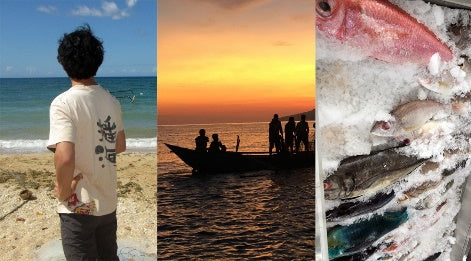[Taiyaki-Chan] "Whole Fish Edible" Series
Harikai's unique bone softening process makes the "whole fish edible" series [Taiyaki-Chan]. The taiyaki-chan is processed so that it can be eaten from head to tail, allowing you to achieve the "Zero Garbage Mission at Home. It can be used as a grilled sea bream or as an ingredient for rice, called Tai-rice. Origin of the name The 1970s hit "Hirake! Ponkicki" was a children's program in the 1970s in Japan. There was a hit song from the show called "Oyoge! Taiyakikun," The name "taiyaki" was derived from the fact that yakitai, with its softened bones, resembles taiyaki without the...
[Harima-no-Saburo Hamo] "Whole Fish Edible" Series
Harikai's unique bone softening process makes it possible to "eat the whole hamo" series [Harima no Saburo Hamo]. Hamo, Common Japanese conger that is too large has been avoided in the market because the small bones inside the meat are so hard that the cooking method of "boning" is no longer applicable. However, we have taken notice of its delicious flesh and made it into kabayaki (broiled fish). As you can see, there are small bones in the fish, but you do not feel the bones at all. Origin of the name In Hyogo Prefecture, large-sized conger eels are called...
Adopted by Michelin Restaurant
Harima Ocean Farm is a group of marine specialists consisting of employees with doctorates and master's degrees in fisheries science. Harikai's fish is selected by restaurants listed in the Michelin Guide and inundated with reservations from all over the world because of its unparalleled taste, which is brought out to the maximum by our unique technology and know-how. This is because Harikai's fish is highly acclaimed for its completely different taste from others.
JICA project feasibility study (SME support type adopted) Participation in fisheries infrastructure in Timor-Leste
In 2018, we were selected by the Japan International Cooperation Agency (JICA) to participate in a case study (SME support type) through a private sector partnership project on fisheries infrastructure in Timor-Leste. Through seven field trips from April to December 2018, we conducted a project feasibility study on "Establishment of Global Food Value Chain Utilizing Harikai-style High Grade Seafood Production" in Timor-Leste. Products produced by the Harikai method of high-grade marine products are value-added "sashimi grade" products in product categories such as frozen fish. The products produced by the Harikai method of high-grade seafood production can add "sashimi grade" value...
Recent articles

![[Taiyaki-Chan] "Whole Fish Edible" Series](http://shop-harikai.com/cdn/shop/articles/image8_1445x.jpg?v=1673148096)
![[Harima-no-Saburo Hamo] "Whole Fish Edible" Series](http://shop-harikai.com/cdn/shop/articles/image6_1445x.jpg?v=1673147946)

